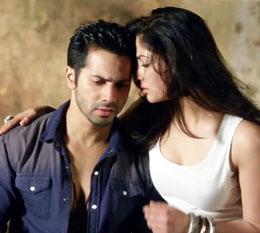Does Bollywood have a women problem?

Raghav Purohit's life is torn apart when bank robbers hijack his wife's car to make a getaway, tossing his infant son out of the passenger side door and shooting his mother dead in the process.
Bereaved of his wife and child, Raghav swears revenge and embarks on a merciless journey to bring those responsible for the murders to justice.
It's a familiar blurb that could apply to any number of movies, but what makes the 2015 Bollywood movie Badlapur stand out is the lengths its anti-hero is willing to go to avenge his family.
Raghav, played by Varun Dhawan, targets a prostitute called Jhimli for information about the killers and repeatedly sexually assaults her during the encounters.
Critics of the movie condemned the scenes as unnecessary and accused its producers of "glorifying a rapist".
Condemning the seemingly lax treatment of rape in the movie, the Indian film critic Anna MM Vetticad wrote: "A more troublesome superfluous moment comes during the song-and-dance accompanying the closing credits, during which Huma Qureshi throws come-hither looks at Dhawan, which is jarring since Raghu had repeatedly raped her character."
While Badlapur tilts towards the more extreme end of misogynistic portrayal in Indian cinema, the problem is widespread, according to researchers.
A 2002 study of popular Hindi language movies from the late 90s said moderate sexual violence against female characters was "depicted as fun, enjoyable, and a normal expression of romantic love".
A more recent 2017 study, which analyzed 4,000 Bollywood movies, found pervasive gender bias in storylines.
According to Swati Tandon, an Indian film producer, and assistant director, misogynistic depictions of female characters are a consequence of an industry dominated by men.
"We don't have a lot of women writers," she said, adding: "All the female characters are being written by men and that's the reason they're very stereotypical."
That's a view shared by the head of the All India Progressive Women's Association, Kavita Krishnan, who told Al Jazeera that even women who manage to break into Bollywood had little influence over the direction the film industry took.
"Actresses or women who are entering the industry find it very difficult to find any space for themselves or find space to tell other stories," Krishnan said.
"[That] is why there tends to be a continuous repeat on a loop of the same kinds of themes over and over when it comes to women."
She explained further that while some Indian movies, such as the 2016 courtroom drama, Pink, portrayed women in powerful roles, they were few and far between and had a small impact overall.
Concerns about Bollywood's relationship with women are not just limited to what's shown on screen, but also extend to the impact of such portrayals on wider Indian society.
One infamous example of behavior normalized in Bollywood is the phenomenon of "eve-teasing", which essentially involves a man ignoring a woman's rejection of his advances until she eventually relents to his pursuit of her.
In Bollywood movies, eve-teasing is a commonly used plot device for the development of a romantic relationship between a male protagonist and his female love interest.
In India and among the Indian diaspora, eve-teasing has become a major societal issue, as men try to emulate the romantic successes of the characters they see in films.
They basically have confused romance with eve-teasing, which is extremely dangerous because that's what young kids are growing up seeing
Several Indian states have introduced punitive measures against men who make unsolicited advances towards women, but women like film producer Tandon argue that authorities are not addressing the root of the problem.
"Our media and our entertainment industry are totally dependent on society for content and society gets affected by the media, so it's very codependent on each other," Tandon told Al Jazeera.
"We've grown up watching Bollywood songs where eve-teasing was a form of romance.
"They basically have confused romance with eve-teasing, which is extremely dangerous because that's what young kids are growing up seeing."
The women Al Jazeera spoke to all agreed that a solution to misogyny in Bollywood would only come about when there was greater representation for women in the industry and when men were no longer relied on to produce stories about women.
"One of the main ways that we'll see change is when more female directors are able to helm cameras and helm the scripts and make films for women by women," said author and columnist Ruchika Tulshyan, adding she wanted to see movies, where women depicted on screen, are "complicated and nuanced".
However, whether such change is on the horizon is another topic and one feminist activist Krishnan is not optimistic about.
"[Bollywood] is a very, very patriarchal industry. It's largely dominated by [a] small bunch of very powerful film families. Of course, there are exceptions to this norm. But the norm is that.









